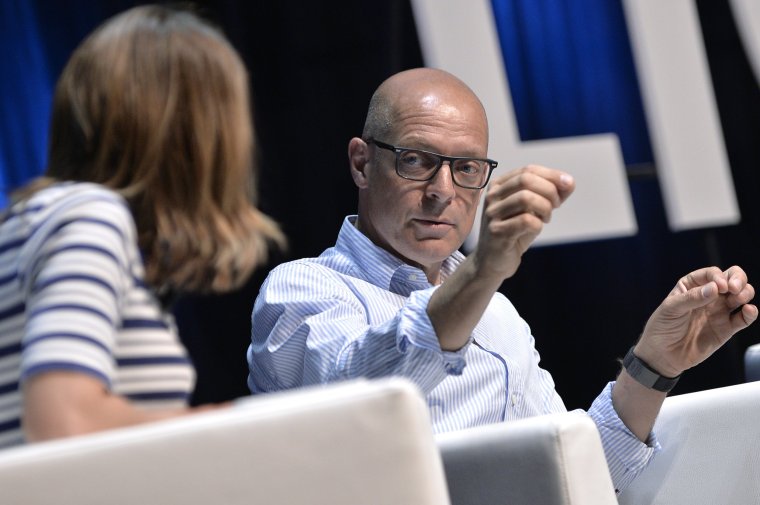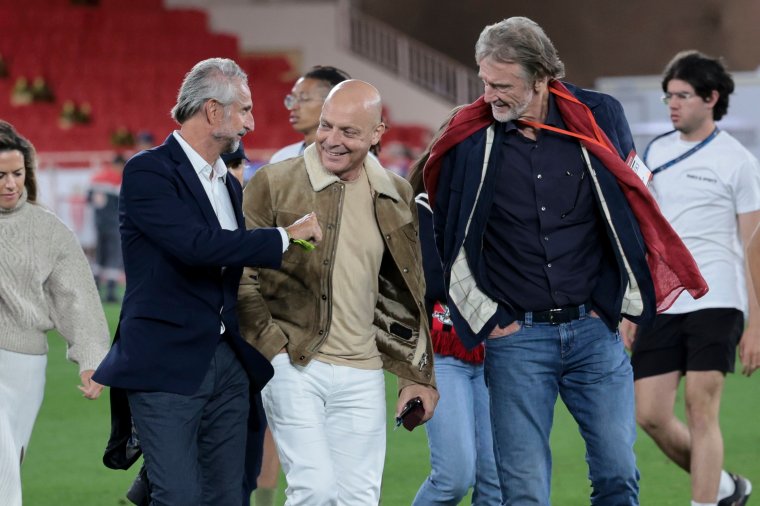One minute he’s living in a caravan at the training ground, the next he’s in your ear insisting that changing your bedsheets can be the difference between winning and losing.
On other occasions, Sir Dave Brailsford disappears into the shadows or can even seem completely disinterested. But he is always watching.
These are the testimonies from the world of cycling about the Team Sky mastermind who will soon embark on his greatest challenge yet – rousing Manchester United from long-term slumber.
But how is a cycling coach, even one who has helped win 18 Olympic gold medals and 12 grand tour victories including six Tour de France titles, going to help a dysfunctional football club?
Brailsford is expected to be part of a three-person committee – alongside Sir Jim Ratcliffe and Joel Glazer – overseeing the football department at United, once Ratcliffe’s minority buyout is completed.
Ineos have not confirmed Brailsford’s specific role, but multiple sources have told i he will be “heavily involved” in all the big decisions.
Alongside Ratcliffe, Brailsford was given a tour of Old Trafford in March and access to the club’s books, with the Ineos pair telling United, in no uncertain terms, what they thought of their below-par performance, especially in the transfer market.
Many United supporters scoffed upon discovering he will be tasked with a key role in revolutionising their club.
Critics pointed to the only other high-profile example of a successful coach switching codes to football: England’s Rugby World Cup-winning leader Sir Clive Woodward and his disastrous attempts to translate his knowledge to the Premier League with Southampton in 2005.
But those who know Brailsford best insist things will be different for the man known for his marginal gains philosophy.
“In the late 1990s, when we set up British Cycling as we know it now, the aim was Olympic success, given we had achieved barely any,” Brian Cookson, former president of British Cycling and the Union Cycliste Internationale (UCI) tells i.
“We needed someone to procure the best kit and equipment and the name Dave Brailsford, from Planet X bikes, came up and he was brought in to do some deals. It soon became apparent that was underusing his abilities.
“He started to help performance director Peter Keen to manage the programmes and even hiring and firing. He also dealt with the media, right away. When Peter left, there was only one guy for the job really. His attitude was ‘give me Peter’s job, I can come in and do even better’. And he did, in fairness.”
When handed the reins as performance director in 2003, Brailsford, and cycling in this country, never looked back.
The Olympic medal tally went from global embarrassment to a river of gold quickly after the 2008 and 2012 games, propelling Brailsford into the limelight – a place he was more than comfortable in.
“Among his many strengths was he was very, very good at selling, especially selling Dave Brailsford,” Cookson adds.

His Olympic success soon transferred to the road as he became team principal at Team Sky, where he oversaw an astonishing six Tour de France wins between 2012 and 2018 for Sir Bradley Wiggins, Chris Froome and Geraint Thomas.
But it was how he went about things, with his innovative thinking, that really started to turn heads.
“He brought in a swimming coach to work with his team, and the cycling world was like ‘what the hell?’,” Team Jumbo-Visma chief executive Richard Plugge tells i. “It was a disaster for cycling, everyone was like ‘what does swimming have to do with cycling?’ He just brought a different way of thinking. He is really good at that. We have to remember, when he started with British Cycling he was not a cyclist. He didn’t know that much about cycling.
“I hated watching his team beat us all the time, but always with the greatest respect. He did it in a way I could not have dreamt at the time. Now we have taken on board all that and have used it to our advantage.
“So many laughed, and that is what I think I admire about him most. I am sure he will be able to do it in other sports, like football.”
Such traits should be music to the ears of even the most sceptical United fans. For too long, big decisions have been taken by ill-placed figures in roles their skillset did not suit, the most obvious example being chartered accountant Ed Woodward being entrusted with the company credit card in the transfer market. The results speak for themselves.
Brailsford has taken the opposite approach. He knows what he is good at, but admits it when he is incapable in other areas.
“Shane Sutton, Dr Steve Peters – Dave finds these people,” Cookson continues. “It was all about the mix of people. Nobody has before or since been able to get that right like Dave did. You’d have some top physiologist, you’d have a really good nutritionist, the guy in charge of all the bikes and the technology and all that sort of thing with Chris Boardman. You’d then have Peters with the Chimp Paradox thing concentrating on emotions.
“On the other end of the scale, you’d have Shane, the sergeant major in the group, who would be like ‘what the f**k are you talking about? Get on the f**king bike and press harder on the f**king pedals’. It just all came together.”
The whole approach, however, revolved around one theme, something that became so entrenched in the zeitgeist it has been adopted by businesses in all fields looking to find an edge over their rivals.
Wiggins, perhaps like many sick of hearing the term marginal gains, labelled it a “load of rubbish”. For others, however, the philosophy, which covers anything from insisting upon hypoallergenic sleeping linen to bringing along his own food truck (because five-star hotels weren’t good enough for his cyclists) has stuck.
“Marginal gains in itself is a maximum gain,” says Team Sky rider Alex Dowsett, author of Bloody Minded: My Life in Cycling, about his career managing haemophilia. “There’s no one big thing, certainly in this era of cycling that’s going to win you races, so you have to focus on all the little stuff. You have to look at your competitors and what can I do? Half a per cent better. And if we can find 10 half a per cents that’s massive.
“The talent that I think Dave had was to look at all of those things and question every single one. Then rewrite the rulebook. Pro cycling was quite an intimidating place with lots of old boys who would sort of point fingers and laugh at the new kid on the block trying to do things differently. He just rewrote the traditions of pro cycling. The stuff that is bread and butter of modern cycling, like putting on a skinsuit for a road race, that was him.”
“I’m not actually sure that he invented the phrase marginal gains,” Cookson admits, however. “I’m almost sure that Peter Keen was the first one to come up with that. I might be wrong but that is another thing he is so good at – taking something, running with it, developing it and delivering it.”
For everything he has achieved with marginal gains, there is always a dark cloud hanging over Brailsford.
Everything centres around a mysterious jiffy bag delivered from British Cycling to Team Sky at the end of the Criterium du Dauphine in 2011, leading to allegations of doping. After five years of simmering speculation, Brailsford said he was told by now ex-British Cycling doctor Richard Freeman that the package contained the decongestant fluimucil. Freeman, however, didn’t have the medical records to prove so.

Following a UK Anti-Doping (Ukad) investigation in 2017, no doping charges were brought against Team Sky or British Cycling, but the select committee report still concluded that Team Sky had “crossed an ethical line” in relation to “therapeutic use exemptions” generally.
While he has always denied any wrongdoing, having set out to help rid the sport of doping – something that for long periods was endemic in cycling – he may never be able to escape suspicion.
His management style, in the eyes of some, is also far from perfect.
“I think one criticism I would have is there was never anything direct from Dave to say ‘well done’ or ‘you did a good job’,” Dowsett adds.
“I remember in my first year at Team Sky, in the Tour of Britain, I’d won the TT [time trial] on the final day and [coach] Sean Yates said to me ‘you’ve single-handedly saved Team Sky’s second most important race after the Tour de France by winning the time trial, well done’. Nothing at all from Dave. Not a word.”
“It wasn’t as smooth as it might appear,” Cookson adds. “At times we weren’t too sure whether he was the right man for the job. I mean, there were some clashes with some riders and sprint squads.
“But every time that there was an issue in those early days, it was a case of do we back him or do we sack him. The results would inevitably come.”
Since leaving British Cycling behind to work for Ratcliffe’s Ineos and their portfolio of sporting entities, the Midas touch has certainly deserted him.
Ineos acquired French football club Nice in a €100m deal in 2018 and he has tried his hand at improving their fortunes, living in that trusted caravan at the training ground for long periods.
However they have so far fallen short of their target of competing in the Champions League, while the Ineos Grenadiers cycling team (formerly Team Sky) has not recently challenged for top honours.
Is he spreading himself too thin and his teams are suffering as a result?
For the man who helped set him on the path to cycling revolution, there is only one way he can have anything like the same effect on the stricken Manchester United as Ineos look to start winning again – go back to what a young, hungry Brailsford thrived on – taking control, his way.
“It’s a big challenge for anybody,” Cookson adds. “I think Dave will need the support of a lot of really good people to change the trajectory of Manchester United. In all the aspects the club appears to be underperforming.
“Dave is a good person to try to be able to do that, but a lot is going to revolve around whether he is given the resources, whether he’s allowed to recruit the right people and whether he gets to make decisions as well.
“He’s a good influencer as well as a good leader. At the end of the day, if you’ve got the ear of Jim Ratcliffe, one of the richest men in the world, he must still have it. It’s going to be a big ask. I would say it’s the biggest challenge of his professional life. He’ll need pretty substantial gains as well as marginal ones this time.”




